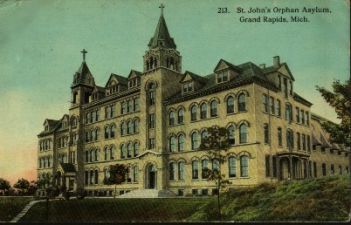
"History of Grand Rapids, Michigan"
Baxter, 1891
Page 355
By will, the late John Clancy of this city bequeathed to the Bishop of the Diocese of Grand Rapids, the Rt. Rev. Henry Joseph Richter, in trust, the sum of $60,000 for the founding of such an institution as this asylum here. During 1888 eight acres were purchased on East Leonard street, two and a half of which were sold to St. Alphonsus Church, leaving, after the opening of Reed and Lafayette streets, about five acres of commanding and sightly grounds upon which during that summer a large wing of the projected building was completed and furnished at a cost of $27,000, and dedicated August 25, 1889. This contains apartments for the ten Sisters of the Order of St. Dominic now in charge, under Mother Angela as Superior, and pleasant accommodations for 150 orphans of ages varying from two or three to twelve years, forty-nine such inmates now enjoying this home. The Rev. Joseph Benning, of St. Andrew's, has had charge of the building. The plan of a structure to cost $75,000 will not be carried out until the demand for more room shall require it, and the balance of the legacy, which is exclusively for construction, will not be drawn upon for the present.
"History of Grand Rapids"
Goss, 1906
Pages 1287 - 1288
St. Johnís Orphan Asylum had its origin in the will of John Clancy, who
bequeathed $60,000 for the founding of such an institution. It was given to
Bishop Richter in trust. In 1888 eight acres were purchased on East Leonard
street, two and a half of which were sold to St. Alphonsus Church, one-half acre
used for street purposes, and the remaining five acres constitute the grounds of
the asylum. A portion of the present building, completed and furnished at cost
of $27,000, was dedicated August 25, 1889. The asylum was opened with three
inmates under the control of the order of St. Dominic, an American order having
its origin in New York City. At first three Sisters were in charge, but as the
needs of the institution increased the number of Sisters increased, until ten
are now on duty in Grand Rapids. The first three inmates came from Saginaw, but
Grand Rapids and vicinity soon furnished a growing school. Within a year there
were nearly fifty inmates. There are now seventy-five boys and sixty girls
receiving instruction and care at the institution, in charge of three teachers
and ten Sisters. In 1896 the building was completed, at a cost of $75,000. The
institution occupies a commanding site, and is one of the first buildings to
attract the eye of a stranger in the city.
By the rules and regulations of the asylum children are received between the
ages of four and eleven, and are not received for a less period than one year.
The asylum is primarily for orphans and deserted children, although
children and wards whose parents and guardians can aid in there support but have
no homes for them are sometimes received and cared for, each case being governed
and judged by its own peculiar circumstances.
Homes are often found for children without parents or friends, and friends and
relatives are found for those deserted or left alone in the world. The
institution is not limited in its charity and good work to the children of any
race, creed or color. Any child without home or friends, whose physical and
mental condition is normal, is eligible to become an inmate of St. Johnís Orphan
Asylum.
It is essentially, however, a Catholic institution, organized and governed by
the church. Its revenues are largely derived from the church. An annual
collection for its maintenance is taken in each church of the diocese. Each year
there is held a supper or fair which has become a social event among all the
Catholic churches of the city, and whose entire income goes for the support of
the asylum. Like all institutions and societies under the control and direction
of Bishop Richter, the asylum is out of debt. The beneficence of John Clancy and
the careful, prudent management of the trust fund has given Grand Rapids an
institution whose benefits can not be overestimated and whose blessings will
increase as the years go by.
|



